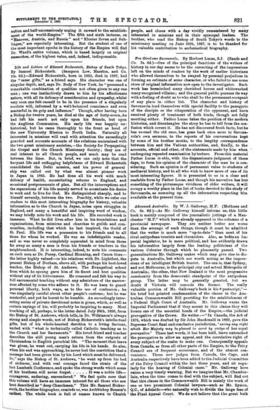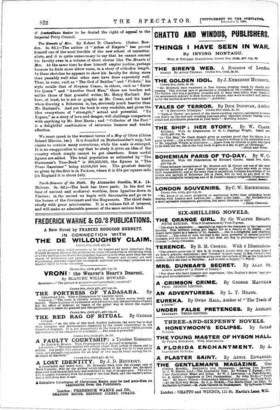Advanced Australia. By W. J. Galloway, M.P. (Methuen and Co.
3s. 6d.)—As Mr. Galloway himself informs us, this little book is mainly composed of the journalistic jottings of a Man- chester "MY." which have already appeared in the columns of a provincial newspaper. They are neither better nor worse than the average of such things, though it must be admitted that the writer is much more " up-to-date " than most of his rival antipodean tourists and chroniclers. Also, as befits an Im- perial legislator, he is more political, and has evidently drawn his information largely from the leading politicians of the various Colonies through which he pleasantly passed. Two generalisations Mr. Galloway makes which may give rise to dis- pute in Australia, but which are worth noting as the impres- sions of an intelligent British tourist. The one is, that Sydney, and not Melbourne, is the principal city and actual Metropolis of Australia; the other, that New Zealand is the most progressive comMunity from the democratic standpoint of the antipodean group. The latter may be generally granted, but we doubt if Victoria will concede the former. The really valuable portion of Mr. Galloway's book is his o postscript,"— his brief but pointed condemnation of the clause in the Aus- tralian Commonwealth Bill providing for the establishment of a Federal High Court of Australia. Mr. Galloway warns the Imperial Parliament that if they assent to this clause they will loosen ont, of the essential bonds of the Empire,—the judicial prerogative of the Crown. He writes In Canada, the Act of 1875, which was drafted by Sir John Macdonald in 1869, gave the Supreme Court final and conclusive jurisdiction, 'saving any right which Her Majesty may be pleased to exert by virtue of her royal prerogative.' These last words, it has been held, leave untouched the prerogative to allow an appeal, and the correlative right of every subject of the realm to make one. Consequently appeals from Canada, as from all other parts of the Empire, to the Privy Council are of frequent occurrence, and of the utmost con- venience. Three new judges from Canada, the Cape, and Australia respectively have been added to the Judicial Committee of the Privy Council within the last three years, and sit regu- larly for the hearing of Colonial eases." Mr. Galloway here raises a very timely warning. But we imagine that Mr. Chamber- lain, when the time comes to deal with the subject, will find out that this_clause in the Commonwealth Bill is mainly the work, of one or two prominent Colonial lawyers—such as Mr. Symon, Q.C., of Adelaide,--who naturally wish to divide the large fees of the Final Appeal Court. We do not believe that the great bulk of Australians deeire to be denied the right of appeal to the Imperial Privy Council.























































 Previous page
Previous page